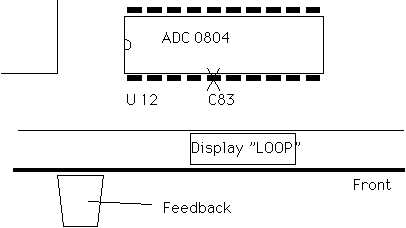Audio Distortion, The internal "Limiter," and
Input/Output gain modifications.
Sounds with high frequencies sound funny. Seems like there is some sort of clipping?
Clipping in the Echoplex Loop audio is a bit frequency dependent, so sounds with high frequencies will tend to distort before other sounds. It sounds quite bad. If you experience this, you have the input level set too high. Turn it down until the loop audio cleans up. You won't experience any distortion when the levels are set right.
The input LED should help you here. You should never see it turn red, that is much too loud. The best point is for the loudest signal to cause the input to just turn orange.
I heard there's a limiter?!
Well, there sort of is, but not really. We have a hardware limiter in there, but it never actually worked right, so we didn't bother to tell anyone about it. I think it might come on at some point, probably keeping an already distorting signal from distorting even more.
The threshold is frequency dependant. So for a full range signal it works, but for a high pitched or attacky signal, it does not prevent distortion. If you are experiencing ugly distortions with sounds with lots of high harmonics, like cymbals or distorted guitars, turn the input down a bit and it will clean up.
The A/D converter can only deal with signals up to a particular amplitude. Anything beyond that causes ugly distortion. Signals with a lot of high frequency components tend to distort more. If you are getting distortion from the echoplex, your input is too loud!!! You should set the input level so that the loudest signal you ever put in does not cause the converter to distort.
There is a circuit in the Echoplex that would be a limiter if it actually worked. Since it doesn't work, calling it a limiter is not really correct. In fact, discussing it at all is sort of pointless. The purpose of having the limiter is to save people who set the levels wrong from experiencing obnoxious digital distortion in their loops. (make the machine smart so the user can be stupid) Limiting just makes the overload condition more palatable. But really, limiting is still a form of distortion, and if you were engaging the limiter all the time you would still be complaining about the sound and I would still be telling you to turn the input level down.
Another solution, which I prefer, is to modify the input so that it has considerably less gain available. That's the next question.....
I don't like the gain structure in the Echoplex. The input gain is too sensitive and the output gain is not loud enough. How can I change it?
This is easily done by changing a couple of resistors. With the change you are much less likely to turn it up enough to distort the input. This also makes the input level knob more useful since more of its range is available. With this mod you also increase the available output gain to compensate for the lower input. In fact, you increase the output enough to correct another common echoplex complaint, which is that the output level is too weak. With the mod the echoplex can work in -10dBu or +4dBu systems without any problem.
To make the gain changes:
Change R30 from 82.5 K to a 22.1 K 1% metal film resistor
Change R10 from 2.21 K to a 10.0 K 1% metal film resistor
This increases output gain and reduces input gain, respectively.
The input section does have a lot of gain available. Probably too much. The reason for this was to allow a wide variety of inputs. We thought it would be great if low level signals, like mics, could be used with the echoplex without requiring a preamp. In retrospect, this doesn't seem like such a great idea, since most people using mics or other low level signals have preamps for them and would probably prefer that over the echoplex preamp anyway. The number of people having trouble with distortion from turning the input up too much is probably much greater than the number that found it useful.
Oberheim is now including this mod in stock Echoplexes, as of late '97 / early '98.
|






